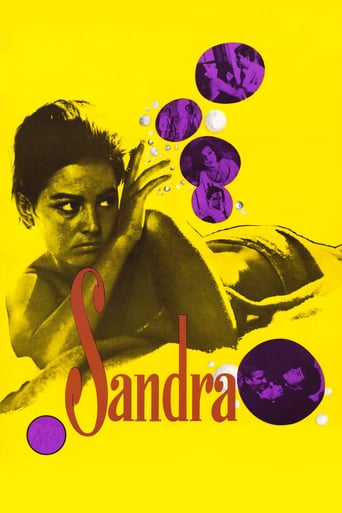alexx668
An uneven entry in the Visconti canon, "Sandra Of A Thousand Delights" comes directly after "The Leopard", and while I consider "The Leopard" a masterpiece, it was still a film where Visconti was developing as a director, not really reaching the masterly stylistic highs of "The Damned" or "Death In Venice", but with a majestically deep plot that made up for any directorial deficiencies.Now, "Sandra Of A Thousand Delights" is still a point in Visconti's career where he's developing as a director. He's close but he's not quite there. Shot in black and white, and with an overly dark photography that emphasizes the desolate feel, even though this is a highly intense drama - perhaps too dramatic for it's own good, it doesn't have the necessary substance to back up the plot. In the end it's just a family drama and nothing more, even if it's a forceful one: Sandra reunites with her family on the eve of her father's memorial service but there's two dark secrets lurking in the shadows; her incestuous affair with her brother, and her adulterous mother's dereliction of her husband (Sandra's father) in a concentration camp.
daniel-smague
This movie is definitely the worst movie Luchino Visconti has ever made. All actors and especially Claudia Cardinale are ridiculous. The choice of black and white could be interesting ,but why to choose so much contrasted black and white photography ? Claudia Cardinale's face has never been so ugly lighted.Visconti's whose masterpieces like "Senso" are so marvelous was completely wrong with this pseudo freudian movie which is, nowadays, very old-fashioned.Even the musical score on the sound track is bad.It's really awful to hear the lines of dialog between Claudia Cardinale and Michael Craig covered by such loud and inappropriate piano concerto.
Tom Doe
As they say, the characters in this movie are based on the Greek mythology, namely, the killed father (Agamemnon), his wife (Clytemnestra), her new husband (Aegisthus), the daughter, Sandra (Electra), the son, Gianni (Olestes) and ex-boyfriend of the daughter, Pietro (now he is a doctor but he comes form a tenant farmer family like in the original), and the Trojan War is replaced with the Second World War ... the story line is difficultly categorized into a direct adaptation like Mourning Becomes Electra (an O'Neill's play, made into a movie by Dudley Nichols 1947), however, it follows the traditions of the Greek tragedies : the past and the blood dominate and determine every destiny of the characters.Here, Andrew (the outsider) is an interesting character. Innocently, (without receiving an oracle!), he analyzes 'the curse' of the dead father rationally, objectively and very ordinarily in vain and opens Pandora's box with his 'good' foolhardiness. Besides, he judges Gianni according to 'his' ethics as a total stranger and raises his fist against his brother-in-law. And still he is never involved in the mythology and should walk away forever. Is he an incarnation of our prosaic civilization of today? The establishment that he is an American (who has a camera!) could be an irony in Visconti's own way?By the way, recently I watched Desperate Housewives, season 2, Episode 9, "That's Good, That's Bad", and suddenly I remembered the scene in which Gianni takes out the pills and threatens Sandra : George who took the pills menaces Bree ... (so I'm writing this comment now, but I know it's an exaggerated analogy, anyway....) Jean Sorel is heavenly beautiful. The scene in the water tower takes my breath away. César Franck's music suits the aestheticism of the director, too.If you are an amateur of Visconti's works, you might know this one doesn't end just as in the original script. Do you think Sandra flies across the ocean to join Andrew or she buries herself in her destined blood there eternally? Including Mourning Becomes Electra, it could be interesting to refer to also : 1. Les Enfants terribles / Jean-Pierre Melville (1950) 2. Höhenfeuer /Fredi M. Murer (1985) 3. Jeux d'artifices / Virginie Thévenet (1987) 4. La Banyera / Jesús Garay (1989 / fantastic!)
pldeaguinaga
After watching "Sandra...", for the first time in mi life I wanted to know who the director was. It was 1966 and me 15, so until that moment, I was only interested in who starred what but never fully understood the director's work enormous importance. Since then, Visconti not only became one of my favorite directors ever but a parameter when judging a film. Actually, I had seen The leopard years before, when I was to young to notice more than the beauty in Cardinale and the sumptuous sets. About "Sandra" I still remember vividly not only how beautiful and glamorous Cardinale looked but how handsome and elegant Sorel was; how mysterious the whole black and white atmosphere was and the intriguing plot... which I didn't fully understood because even if the action seemed to say something, the subtitles said something else!. I thought then my mother was right when she used to tell me: You are too young to understand this and that. Well, not without relief, I learn, years later, than the subtitles had been made in Spain, during the Franco's days, so its censorship had erased all incest traces. After that, a new copy was made to match subtitles and story (and thats, thankfully, what you can find, at least in Spanish!). But even after so many years, and in my adulthood, I find Sandra as magical as the first time and still is one of my favorite movies, as many Visconti's works like Rocco and his brothers, Death in Venice or The dammed, as well, of course, The Leopard.



